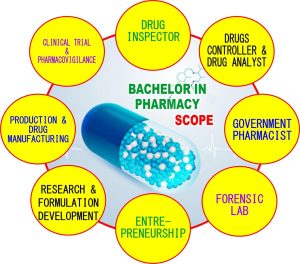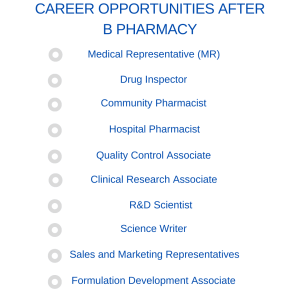Introduction
The B. Pharmacy route stands as a cornerstone inside the realm of healthcare training, imparting complete information on pharmaceutical sciences and their pivotal position in society. Aspiring pharmacists embark on this adventure to apprehend the intricacies of drug formula, pharmacology, and affected person care. With its emphasis on innovation and affected non-public well-being, the B. Pharmacy route nurtures professionals who contribute substantially to advancing healthcare and ensuring the safety and efficacy of medicinal drugs.
What is a B.Pharmacy Course?

A B. Pharmacy direction, short for Bachelor of Pharmacy, is an undergraduate educational degree application designed to teach college students approximately the technology and exercise of pharmacy. It encompasses various factors of pharmaceutical sciences, which consist of drug discovery, development, production, dispensing, and the safe and powerful use of medicinal drugs. The curriculum usually covers subjects together with pharmacology, pharmaceutics, medicinal chemistry, pharmacognosy, pharmaceutical analysis, and pharmacy exercise.
Brief History and Evolution:
The B. Pharmacy direction has its roots in historic instances while apothecaries and herbalists practised the artwork of getting ready and dispensing medications. However, formal schooling in pharmacy started to take shape within the nineteenth century with the setup order of number one pharmacy schools in Europe and the United States. These early programs centred on offering university college students practical talents in compounding and meting out capsules.
Over time, advancements in pharmaceutical sciences and healthcare added approximately the evolution of the B. Pharmacy curriculum to include a broader range of topics which includes pharmacology, pharmaceutical chemistry, and pharmacy management. With the short boom of pharmaceutical corporations in the 20th century, the decision for certified pharmacists improved, further riding the development of pharmacy education.
Today, B. Pharmacy packages are presented through numerous universities and schools globally, catering to the developing call for professional professionals within the pharmaceutical vicinity. The curriculum is continually updated to include the extremely modern tendencies in pharmaceutical studies, era, and regulations, making sure that graduates are nicely geared up to fulfil the evolving needs of the healthcare industry.
B. Pharmacy Eligibility and Admission Process
Bachelor of Pharmacy (B. Pharmacy) is an undergraduate instructional diploma program in the field of pharmacy. It encompasses a wide range of topics associated with pharmaceutical sciences, which include drug discovery, pharmacology, medicinal chemistry, pharmaceutics, pharmacognosy, and pharmaceutical evaluation. Here’s a detailed explanation of the eligibility criteria and admission process for B. Pharmacy programs.
Admission Process
The admission technique for B. Pharmacy guides generally entails the following steps:
Registration:
- Candidates need to sign up for the entrance checks performed by using the respective institutions or exam bodies. This registration process typically takes region online via professional websites.
Entrance Exam:
- Candidates should seem for the doorway exams at the scheduled date and time. These tests investigate the candidate’s understanding in subjects like Physics, Chemistry, Biology/Mathematics, and General Aptitude.
- Based on the overall performance inside the entrance exam, candidates are shortlisted for similarly rounds of the admission technique.
Counselling/Interview:
- Shortlisted candidates may be known as for counselling or an interview spherical conducted by using the respective colleges.
- During counselling, applicants can be required to fill out choice bureaucracy for colleges and guides primarily based on their rank within the front exam.
Seat Allotment:
- After counselling, faculties launch advantage lists based totally on the candidate’s overall performance within the entrance exam, interview (if relevant), and other criteria.
- Seats are allotted to candidates consistent with their rank inside the merit list and the availability of seats inside the respective schools.
Document Verification and Admission:
- Finally, candidates must entire the report verification system on the allocated college.
- Once the documents are tested, candidates can continue with the admission process by using paying the considered necessary prices and finishing different formalities.
Eligibility Criteria
For the B. pharmacy track, candidates need to fulfil some eligibility criteria that usually comprise:
Educational Qualifications:
- Candidates should have completed their 10 2 education with Physics, Chemistry and Biology/Mathematics as compulsory subjects from a recognized board or university. Some institutions may make English a compulsory subject in 10 2
Minimum Marks Requirement:
- Most colleges want candidates to score minimum aggregate marks of around 50- 60 per cent in their 10 2 exam. However, different mark requirements may also differ depending on the institution and sometimes the candidate’s category (such as SC/ST/OBC).
Age Limit:
- Usually, there is no specific age bar for admission into B. Pharmacy courses. But, some institutes can have an age restriction so students must go through the terms of their respective colleges.
Entrance Exams:
- Certain colleges might also perform entrance examinations to get admission into their B. Pharmacy programs. These exams are conducted at a national level, state level or institutional level.
Career Opportunities available in Pharmacy in India

In India, pursuing the B.Pharm (Bachelor of Pharmacy) degree program opens many career prospects. These are the professional choices and their average salaries:
- Pharmacists: Pharmacist plays a crucial role in dispensing medicines, providing patient education and ensuring safe usage of drugs. They can work in places like hospitals, community pharmacies or drug manufacturing companies. The average salary of pharmacists in India ranges from 2.5 to 5 lakhs per annum.
- Drug Inspector: Drug inspectors are responsible for ensuring the implementation of drug laws as well as regulations. They work as manufacturing centres, review documentation and inspect quality control systems. Drug inspector’s earnings p.a in India is about 4-8lakhs INR.
- Production Executive: This position entails management of the production process within pharmaceutical firms. It involves liaising with various departments to ensure the smooth running of production processes while meeting quality standards. The pay range for Production Executives is between INR 3-6 Lac PA.
- Quality Control/Quality Assurance Analyst: Quality manipulate and warranty analysts are responsible for making sure of the quality and protection of pharmaceutical merchandise. They behaviour exams, analyze information, and maintain compliance with regulatory standards. The average salary for QA/QC analysts in India is around INR 3 to 6 lakhs per annum.
- Clinical Research Associate: The clinical studies associates coordinate and reveal scientific trials to assess the protection and efficacy of recent drugs. They work closely with researchers, physicians, and regulatory authorities. The common salary for scientists from INR 3.5 to 7 lakhs per annum.
- Regulatory Affairs Manager: Regulatory affairs managers ensure compliance with regulatory requirements for pharmaceutical merchandise. They put together and post files to regulatory companies and facilitate the approval manner. The average salary in India is around INR 5 to 10 lakhs per annum.
- Medical Writer: Medical writers prepare files writing like studies papers, regulatory submissions, and academic materials associated with prescribed drugs. They require sturdy writing capabilities and information on medical terminology. The salary for medical writers from INR 3 to 6 lakhs per annum.
- Hospital Pharmacist: Hospital pharmacists work inside clinic settings, participating with healthcare teams to provide remedy therapy management and make certain safe medicine use. The average salary for pharmacists in India is about INR 2.5 to 5 lakhs in line with annum.
- Academic/Research Scientist: Academic or studies scientists paintings in universities, studies establishments, or pharmaceutical companies to investigate drug improvement, pharmacology, and associated regions. Salaries vary depending on experience and qualifications however usually vary from INR 4 to 10 lakhs in keeping with the annum.
- Entrepreneur: B.Pharm graduates also can venture into entrepreneurship by beginning their very own pharmacy or pharmaceutical-related commercial enterprise. Income ability varies significantly depending on the achievement of the assignment.
Higher Education and Specialization
Higher education in pharmacy offers several opportunities for individuals seeking advanced information and specialization in various fields related to pharmaceutical sciences. Pursuing a Master of Pharmacy (M.Pharm) and a Doctor of Philosophy (Ph.D.) are common pathways for those interested in delving deeper into pharmacology, pharmaceutics, and associated disciplines. These packages provide superior theoretical knowledge, realistic competencies, and studies possibilities, preparing graduates for numerous careers in academia, industry, studies, and healthcare.
Master of Pharmacy (M.Pharm)

The Master of Pharmacy (M.Pharm) application is a postgraduate diploma that offers specialised training in various aspects of pharmacy. It commonly spans two years and gives in-intensity know-how and realistic abilities in specific regions which includes pharmacology, pharmaceutics, pharmaceutical chemistry, pharmacognosy, pharmaceutical evaluation, and clinical pharmacy. Students can pick a specialization based on their pastimes and career desires.
Specializations in M.Pharm
- Pharmacology: This stream is concerned with the study of drugs, how they function, interact with living systems and affect human health. Students are introduced to concepts such as pharmacokinetics, pharmacodynamics, drug design and toxicology.
- Pharmaceutics: It is about the manufacturing, formulation and delivery of pharmaceutical dosage forms. Drug development process, dosage form designing, biopharmaceutics and pharmaceutics technology are examples of what students learn about.
- Pharmaceutical Analysis: Another specialization focuses on analytical techniques used in pharmaceutical research and quality control. For instance, students gain knowledge on drug characterization by chromatography, spectroscopy, and mass spectrometry among other methods.
- Pharmacognosy: Concerning this discipline of study it involves investigating medicinal plants or natural products for utilization during drug discovery and development. In addition to studying the therapeutic properties of herbal medicines; students also get into their chemical composition as well as biological activity.
- Clinical Pharmacy: Clinical pharmacy majors in the use of drugs rationally in patient care. Medical therapy management including pharmacotherapy services to patients among others like counseling patients regarding their medications plus provision of drug information represents some aspects learnt by these students.
Doctor of Philosophy (Ph.D.) in Pharmacy
A PhD in Pharmacy is a research-focused doctoral diploma that permits college students to conduct unique research in particular regions of pharmaceutical sciences. It typically takes 3 to five years to complete and entails superior coursework, complete exams, and the finishing touch of a dissertation based totally on authentic studies.
Ph.D. Specializations
- Pharmacology: PhD candidates in pharmacology delve deep into expertise the mechanisms of drug action, molecular pharmacology, signalling pathways, and the improvement of novel therapeutics. Research may attention on areas including most cancers pharmacology, neuropharmacology, or cardiovascular pharmacology.
- Pharmaceutics and Drug Delivery: This specialization entails studies on novel drug transport systems, nanotechnology-based drug transport, focused drug delivery, and formula development to enhance drug efficacy and patient results.
- Medicinal Chemistry: Ph.D. College students in medicinal chemistry attention at the layout, synthesis, and evaluation of latest pharmaceutical compounds. Research may additionally involve computer-aided drug design, structure-pastime courting studies, and the development of capacity drug applicants.
- Pharmaceutical Sciences: This interdisciplinary specialization encompasses diverse aspects of pharmaceutical studies, which include pharmacokinetics, pharmacodynamics, drug metabolism, pharmacogenomics, and structures pharmacology.
Conclusion
Let’s consider the B. Pharmacy route leads a strong foundation for university college students intending to excel in the pharmaceutical business enterprise. It provides complete facts in pharmacy, this application equips individuals with the abilities wanted for exceptional roles in drug improvement, manufacturing, and affected person care. With 4 years and lower prices, the B. Pharmacy routes provide a low fee to a successful professional. Prospective college students thinking about this field can find esteemed institutions like Krupanidhi College, one of the first-class pharmacy faculties in Bangalore, for its top-notch schooling and organisation-oriented curriculum. This provides a door to many opportunities like healthcare, studies, etc. Therefore, pharmacists encourage you on this journey, as it has wonderful effects on society.
FAQs (Frequently Asked Questions)
- What is the best option after B Pharmacy?
The best option after B Pharmacy is pursuing higher education such as an M.Pharm or Ph.D.
- Is B pharmacy a good career?
Yes, B. Pharmacy can lead to various sectors like the pharmaceutical industry, healthcare, research, and academia.
- Are there any specific industries or sectors that highly value B Pharmacy Graduates?
The Industries highly value B Pharmacy graduates such as pharmaceuticals, biotechnology, healthcare, research and development, and regulatory affairs.
- Does B Pharmacy require NEET?
No, B. Pharmacy does not require NEET for admission. However, it may require for specific course in some cases.